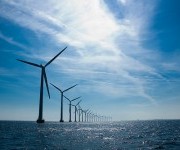First things first: The U.S. won’t be getting even a significantly stripped-down climate and energy bill, or won’t until September at the earliest, at least in part because of a debate over the provision that would have eliminated the liability cap of $75 million on offshore drilling. The White House says a bill could still be passed this year, and Senate Majority Leader Harry Reid (D-Nev.) says it might be a broader bill than the one that was originally slated to be voted on Wednesday.
Meanwhile, the Obama administration’s fallback effort to regulate carbon emissions via existing EPA authority under the Clean Air Act is under heavy bombardment. Sen. Jay Rockefeller (D-W.Va.) wants to amend any energy bill to delay EPA action on carbon emissions for two years, which, according to a White House spokesperson, would lead to a veto. Rockefeller says this amendment will come up again, attached to any number of other bills.
Multiple petitions filed by Peabody coal, Texas, Virginia, and the U.S. Chamber of Commerce questioning regulation of greenhouse gases were flat-out rejected by the EPA, mostly on the grounds that “Climategate” isn’t a real scientific controversy. Texas responded by combining its objections to greenhouse gas regulation with its objections to the EPA overruling its use of “flexible air permits” when regulating air quality in general. The state has pledged non-cooperation with the federal government on both counts.
“You can always count on Americans to do the right thing: This week, U.N. climate negotiators preparing for the next international climate meeting in Cancun met in Bonn, where they expressed pessimism in the wake of U.S. failure to pass climate legislation even as the U.S. re-affirmed its commitment to meeting its pledge to cut greenhouse gases. At the start of the meeting, researchers announced a new, more comprehensive CO2 emissions model describing exactly how much greenhouse gases can be emitted in order to stay below 3.6 degrees F of warming.
… after they’ve tried everything else”: An analysis by Bloomberg News revealed that fossil fuel subsidies in the U.S. are 12 times as large as those for renewable energy, and a bipartisan coalition formed to block EPA regulation of coal ash — the stuff left over after burning coal — as hazardous waste.
Montana, a state rich in coal, upped its own renewable energy standard to 25 percent of electricity generated by 2025, while a coalition of appliance makers convened ahead of meetings with the Department of Energy (DOE), hammering out efficiency standards for dishwashers, refrigerators, and other appliances that could lead to significant energy savings.
We’re #2: Behind China, the U.S. was the second fastest-growing wind power market in the world in 2009, but 2010 is expected to be a slow year. Financing woes, general economic malaise, and competition from Chinese firms mean that wind turbines are going for fire-sale prices.
Storage of the intermittent power from renewables got a boost when the DOE made its 14th loan guarantee, for $17.1 million, to A123 systems for grid-scale banks of batteries. (A123 is also providing batteries for the forthcoming Chevrolet Volt.) Xcel energy also announced a successful test of a gigantic one megawatt grid-scale battery. Dupont will build a factory in Virginia for domestic production of more-efficient batteries for electric vehicles.
Here comes the sun: The DOE thinks grantee 1366 Technologies can produce silicon solar cells at half their current cost, Spain is cutting its solar incentives by 45 percent, and the U.K.’s incentives — specifically feed-in tarrifs — have made it the fastest-growing solar market. California is about to get its first commercial scale solar-thermal plant in 20 years.
Boulder’s experiment in building a Smart Grid is way over budget, Chicago is the first city in the U.S. with a subdivision sporting net zero energy homes, and, on the other side of town, citizens are trying to shut down the city’s ancient coal fired power plants.
Overall, mostly late-stage renewable energy startups hit a record of $1.5 billion in investment in the second quarter of 2010.
Would the real culprit for the death of the climate bill please standup?: A working paper from Yale argues that increased unemployment leads to decreased concern about the environment.
Climate change winners and losers: The ongoing heatwave in Russia (this is Moscow’s hottest July ever) inspired President Dmitri Medvedev — who has in the past referred to climate change as a Western conspiracy — to do an about-face on the issue. The damage to Russia’s wheat crop (and projected flooding in Canada) contributed to the fastest rise in wheat prices since 1973.
Globally, the National Oceanic and Atmospheric Administration declared it the hottest decade on record. Climate scientists pointed out that Philadelphia’s record July temperatures are predicted to be the norm by 2050.
Alaska’s growing season is getting longer, but climate scientists project agricultural “upheaval” this century for one of the world’s largest exporters of food, Australia.
Devastating floods struck Pakistan, and paleoclimatologist James White projected that sea level rise sufficient to swamp Miami is now unavoidable.
After the climate bill: Frank O’Donnell, president of the Clean Air Watch, is one of many activists turning their attention to all the other issues the struggle for a climate change bill pushed aside. He had this to say to Politico:
It’s quite obvious for the last several years that the climate debate has sucked up all the oxygen from other environmental issues. After the fighting and exhaustion of climate, there are a lot of other issues waiting in the queue.
The Climate Post offers a rundown of the week in climate and energy news. It is produced each Thursday by Duke University’s Nicholas Institute for Environmental Policy Solutions.


